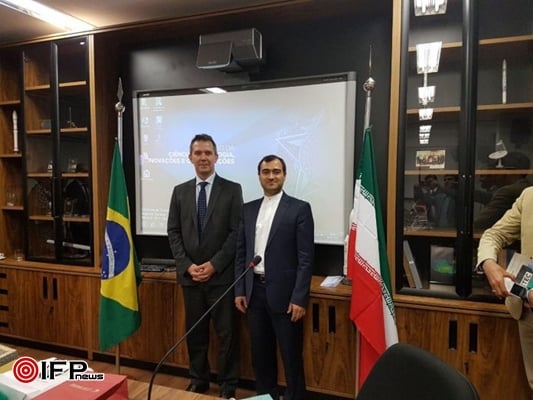The working group was established three years ago, but had not met until now. Zarif’s trip created an opportunity for the working group to meet.
In the meeting, the two sides stressed the importance of working together closely in the domains of science, technology and innovation.
During the 4-hour program, opportunities for mutual cooperation on science, technology and innovation in various areas, particularly nanotechnology, were discussed under an action plan.
In the domain of university affairs, B2B programs were envisaged for sci-tech parks. Plans to give fresh impetus to research at universities were also introduced.
The Iranian delegation at the meeting was led by Mr Birang, the director of the Centre for International Sci-Tech Transactions of the Iranian Vice-Presidency for Science and Technology. The Brazilian team was led by a top Brazilian official in charge of technological development and innovations.
The Iranian side touched upon Tehran’s good cooperation with Russia, China and Austria on science and technology, and said Iran has set up a special center for international cooperation in the fields of science and technology.
For a brief review of Iran’s achievements in various fields of science and technology, check the book “Science and Technology in Iran: A Brief Review”
Accordingly, Iran has introduced diverse models of cooperation with different countries, including joint committees or joint funds, and similar models can be used for cooperation with Brazil.
Birang also referred to the efforts made in recent years to develop knowledge-based companies in Iran and to use them to create a knowledge-driven economy and create jobs for university graduates. He said the two countries can share one another’s experience in those areas.
The Brazilian side, in turn, described the meeting as fruitful and said nanotechnology can be a starting point for both sides to expand their cooperation in different areas.
He also proposed a team from his country take part at an international exhibit due to be held in Tehran in 2018.
At the beginning of the meeting, the Brazilian side said Brasilia knows Iran has conducted good activities in the fields of modern technologies and knowledge-based economy. It was also stressed that the two sides can work together closely in pertinent fields.
Also addressing the gathering was Reza Asadifard, the deputy head of the Iranian Technology Development Committee for the industry and market, who presented a report on Iran’s recent accomplishments in the field of nanotechnology.
He says Iran’s current status in nanotechnology is the result of an intensive ten-year plan running from 2006 to 2016. Among the achievements mentioned in his report were Iran’s securing the fourth place in the world in terms of producing science in nanotechnology with a 6.5-percent share of the world’s whole scientific productions in the domain of nanotechnology, training more than 35,000 nanotechnology experts, having over 210 international nanotechnology patents registered, establishing some 170 nanotechnology production companies and commercializing over 400 products which are based on nanotechnology.
He concluded by putting forward proposals on Iran-Brazil cooperation in the field of nanotechnology.
The Tuesday meeting was attended by deputy head of Iran’s Nanotechnology Development Commission for the market industry as well as representatives of eight knowledge-based companies.
The Brazilian team also comprised representatives from most Brazilian organizations operating in the fields of science, technology and innovation.
Iran has in recent years made great progress in various scientific fields, particularly nanotechnology, in which the country ranks seventh globally.
The incumbent administration has adopted plans to commercialize knowledge-based firm, as knowledge-based activities can make a significant contribution to Iran’s economic development by increasing added value among other things.
The main priorities are to promote the establishment of more knowledge-based firms and to encourage universities to focus largely on knowledge-based economy.
There are over 3,000 such companies in the country, which can benefit from governmental loans to finance their projects
Experts believe nanotechnology could worth a lot to the Iranian economy, as Iran currently ranks seventh globally in this field, according to the data released by Iran’s Vice-Presidency for Science and Technology.
The government plans to boost export of nanotechnology-related products and equipment to $1 billion by 2019.
Promoting knowledge-based companies is a main principle of Resistance Economy, a concept aimed at weaning the Iranian government from heavy dependence on oil revenues and boosting productivity and export
It was first proposed by the Leader of Islamic Revolution in 2011, amid the tightening of international sanctions on Iran, which were imposed over unproven allegations that its nuclear program has military purposes.
The sanctions were lifted under the 2015 nuclear deal, which removed international sanctions in return for confidence-building curbs on Iran’s nuclear work.
